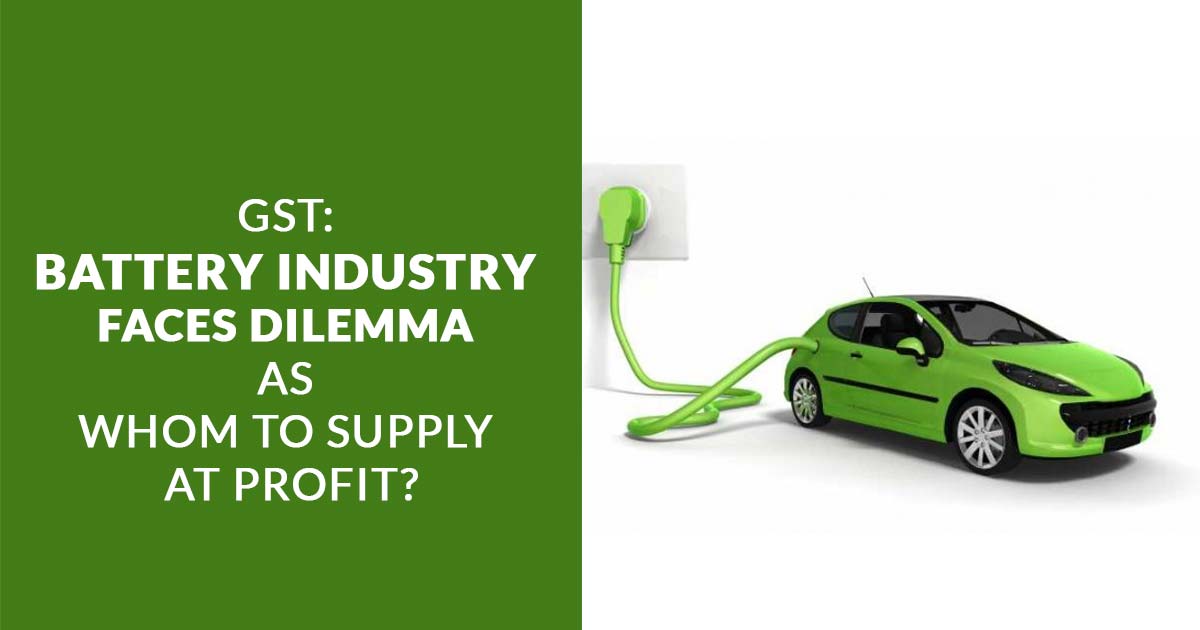Battery manufacturers are facing problems in terms of the increasing battery demand both from the Automobile and Telecom sector. The demand from the telecom sector is found to be all time high whereas the demand from the Automobile sector has also taken speed just after the Electric vehicles are coming into the scene. The automobile companies believe that the electric vehicles would be the first choice for the customers in days to come and thus they are investing much on the technology and Research and Development process. On the other hand, the Telecom industry has also increased battery demand. The basic problem being faced by the battery manufacturers is the increasing price of the raw material used in the manufacture and that is Lead and Sulphuric Acid and this is impacting the profitability of the manufacturers.
GST: A Bridge Between Organized & Unorganized Sectors.
Government is trying to give equal growth and profit opportunity to the organized and the unorganized sectors by making all the small-scale industry to pay tax. After the implementation of this law, even the small-scale industries have to pay the GST tax and thus the organized sector will get a handsome share out of the unorganized sector. This will remove the differentiation in prices of the batteries of organized and unorganized players in the industry.
Due to the price competitiveness of the unorganized battery makers, which comprises 40 percent of the market, are moving towards organized and this is due to the positive impact of the GST implementation. The shift is evident from the result of year on year growth in automotive battery volume as reported by ARBL, which is 18 percent.
Exide, a leading battery manufacturer, is now targeting the unorganized market by bringing the competitively-priced products in the market.
The Position of Some Famous Battery Manufacturing Firms:
Amara Raja Batteries (ARBL): ARBL showed year-on-year growth of 18.8 percent in net sales for the first quarter of the Financial year 2019 followed by a 30 percent volume growth in terms of automobile segment. Though the Telecom sector still underperformed thus creating pressure on the industrial segment. Other sectors in the industrial sector showed growth in double digit.
ARBL is now focusing on the utmost utilization of their capacity and increasing the productivity in order to meet the growing demand. ARBL’s capacity utilization in the Automobile segment records 90 percent. The motive behind the strategy of utmost utilization is to expand the automotive capacity to 36 million units by the Financial year 2020 which is currently 25 million units in the FY18.
The inverter capacity is also running at complete utilization.
On the other hand, Exide has adopted the strategy of technological up-gradation and cost reduction for their growth. Exide is now in collaboration with Switzerland-based Leclanche to build lithium-ion batteries and energy storage solutions, which would be used in electric vehicles.
Exide Industries (Exide): Exide running in profitability has shown a growth of 32.6 percent in revenue as it has been in great demand in the Automotive segment. UPS, telecom and solar sectors have shown remarkable growth in the first quarter of the first Financial year 2019.
A Quest To Reduce The Price Of Raw Material
As seen in the recent past the manufacturing companies are struggling due to the increased cost of the raw materials they use in manufacture. As an impact of highlighting the problem, we can see a decrease in the lead price and is down by 9 percent from the first quarter of the financial year 2019.
This measure would help in the increase in production.
Lithium-ion Batteries and the Challenges Attached to Their Manufacture
About 70 percent of all lithium is produced in South America, as the reserves are concentrated there and thus the Indian manufacturers need the government’s help for the import of the same for the manufacture of the Li-ion batteries.
Technological know-how
As evident, the electric vehicle requires high energy density and storage capacity and fast charging abilities. But Indian manufacturers are yet to develop such technology which contains these capabilities. Exide and ARBL have moved a step ahead in this direction. ARBL is using tubular flooded batteries, a superior technology to provide batteries to e-rickshaw.
Read Also: 28% GST on E-rickshaw Tyres: A Serious Issue for Poor Man
An EV requires its battery to have high energy density and storage and fast charging abilities. Indian battery manufacturers are yet to source/develop the technology to manufacture batteries that have these capabilities. Exide’s collaboration with Switzerland-based Leclanche is one step in that direction. ARBL is also using superior technology (tubular flooded batteries) to provide batteries to e-rickshaws.
Source: https://www.moneycontrol.com
